.
STEREO REVIEW'S SELECTION OF RECORDINGS OF SPECIAL MERIT--BEST OF THE MONTH
Carl Orff's Der Mond: The Zesty Sizzle of Refreshingly Audacious Orchestral Sonorities
THOUGH more like a morality play than an opera, Carl Orff's Der Mond was expressly written for the stage, un like Carmina Burana, the composer's first major work, which had immediately preceded it. Associating the two is inevi table, however, for Der Mond has very much the same musical characteristics as its predecessor--simple diatonic melodies, ostinato rhythms, heavy reliance on percussion-and in much the same proportions. What it does not have is any of the excesses of Orff's later work, which have caused even some of his most enthusiastic partisans to develop second thoughts about him.
First of all, Der Mond is fun to listen to. It is lighthearted, musically light-textured, fast-moving, and brief enough that its high energy level will not exhaust you. Orff has deftly alternated singing and speaking lines in the vocal parts, and his orchestration is zesty, refreshing, and full of surprising sonorities-even the most recklessly audacious effects delight the ear. There is no thought of a unified style-the music evokes in turn the spirits of oratorio, operetta, cabaret, even Bavarian folk song-yet the composer not only makes it all hang together but work with a virtuoso flair.
There is a story, too, and the scholarly annotations that accompany Philips' new recording of the work take its symbolism very seriously. It is about four country lads who steal the moon from a neighboring village. In time, they grow old and die, each taking his share of the moon with him to the beyond. After some complications, St. Peter intercedes and eventually returns the moon to its rightful position in heaven. I have streamlined the plot in the interest of avoiding tedium (Off himself adapted the libretto from one of the Grimm fairy tales), and suggest that you try not to take it too seriously either. Only the music matters, and if you respond to Off at all, you'll find that Der Mond matters a great deal.
It would be impossible to over-praise the achievement of conductor Herbert Kegel and chorus master Horst Neumann for their work in this recording: the music sizzles with excitement, and the unconventional orchestration is captured in sharp detail. Eberhard Buchner, whose role here is similar to that of one of Bach's Evangelists, delivers his high lying music exquisitely, and Reiner Suss does justice to both the majestic and the coarse elements of "Petrus" expertly.
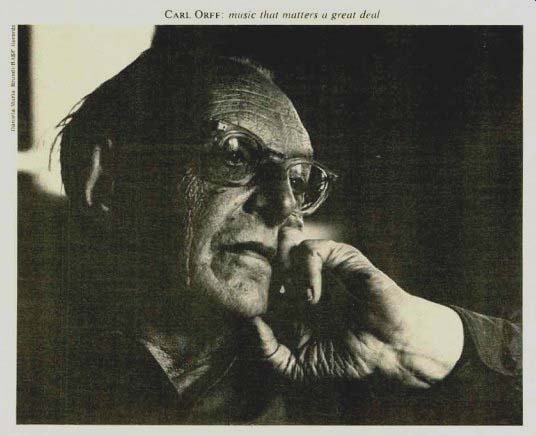
--- CARL ORFF: music that matters a great deal
The rest of the cast forms a good ensemble--no more, indeed, is expected of them. I heard one bad tape splice on side one, but the sound otherwise is just about perfect. George Jellinek ORFF: Der Mond. Eberhard Buchner (tenor), Narrator; Reiner Suss (bass), Petrus: Helmut Klotz (tenor); Horst Lunow (baritone); Fred Teschler and Armin Terzibaschian (bass); the Four Fellows; Wilfried Schaal (baritone), a Farmer; others. Leipzig Radio Chorus and Symphony Orchestra, Herbert Kegel cond. PHILIPS 6700 083 two discs $15.96.
A Hearty Welcome to The Poetic Emanuel Ax, Latest Laureate Of the Keyboard
EMANUEL Ax is the twenty-six-year-old, Polish-born, American-trained, First Prize winner of the Artur Rubinstein International Piano Master Competition held in Israel in 1974. Al though the winners of major competitions are frequently rushed by record companies (to produce another Tchaikovsky First or Rachmaninoff Third), few competitions carry a recording con tract as an intrinsic part of the prize. This one does, and it obviously helped Mr. Ax to dodge the inevitable demand for more hackneyed repertoire in his just-released first recording on the RCA label. Not that the Chopin B Minor Sonata on side one is not already over-represented in the catalog; but it would take a frugality beyond my imagining to refuse to duplicate that piece to obtain the exquisite pianistic pleasures on side two.
Mr. Ax's Chopin is capable, musicianly, neat, and reserved; it is a performance no one need be ashamed of, but I would be less than candid if I said that it did not strike very many sparks for me.
The other side of the record is quite an other thing, and in particular the Schubert-Liszt Liebesbotschaft. I don't mind saying that I have never heard this per haps most beautiful of all Liszt transcriptions played so beautifully before, and though I may hear it played as beautifully in the future I have no expectation of hearing better. Certain characteristics of Ax's musical personality and pianistic ability really come out here, and they are not what one would necessarily expect from someone of his background and training. Yes, of course, he has the technique; no one who studied with Mieczyslaw Munz, as Ax did at Juilliard, could possibly be without it. But Ax is a far more skillful colorist-and color is obviously important to him-than most young virtuosos, Polish or otherwise.
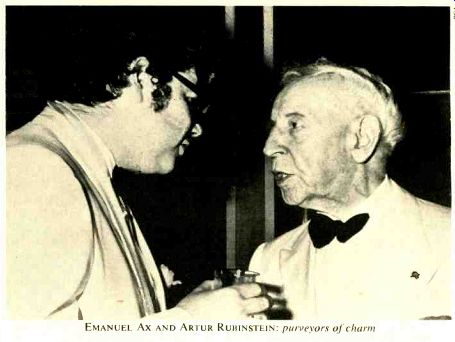
--- EMANUEL Ax AND Artur Rubenstein purveyors of charm
His Liebesbotschaft has all the inner voices (and the outer ones) and a different color for each, a strikingly gorgeous arrangement of sounds. But, beyond the colors, Ax produces phrasings-the way Schnabel produced phrasings. It would not be quite correct to say that he makes the music sing. He sees through the Lisztian transcription to the Schubert underneath, yes, but what he gets out of it is more akin to an undiscovered impromptu or moment musical than to a Lied. In other words, he has the phrasings of Schubert's own piano music, and so what we hear seem not to be Lisztian transmogrifications (except in places) but new keyboard masterpieces of Schubert's maturity. If all this sounds like a rationalization of having fallen in love with this performance, so be it. You listen to it; you'll fall in love with it too.
Liebesbotschaft is the best, but Horch! Horch! Die Lerch! gets some beautiful playing too. The other two are less apt as transcriptions, but again Ax does lovely things with the phrasings. Of the echt Liszt material, Gnomenreigen gets an amply virtuosic and musically sensitive performance, and the etude has all fingers flying-but with a vital trace element, all too often missing, present as well: charm. There's quite a lot of that on the disc. It makes it all the more apt that the contest Ax won was named after Rubinstein, another purveyor of that quality as elusive as it is fragrant. The recording seems a little more distant than RCA's usual piano efforts, but it also has a little more bass.
James Goodfriend
CHOPIN: Sonata No. 3, in B Minor, op. 58. SCHUBERT-LISZT: Das Wandern; Der Muller and der Bach; Liebesbotschaft; Horch! Horch! Die Lerch! LISZT: Gnomenreigen; Etude No. 6, in A Minor, after Paganini. Emanuel Ax (piano). RCA ARL 1-1030 $6.98.
Steve Goodman: One of the Best And He Continues To Get Better
ARE there no more worlds for a troubadour to conquer? Was Alexander the Great really crying because he felt self-parody was about to set in? Well, weep not; Gordon Lightfoot was not merely passing the time when he said what he's trying to do now is to refine what he's been doing, that a good song will last and one's performance of it can always be improved. Steve Goodman's new Asylum album, "Jessie's Jig & Other Favorites," shows graphically how you and I and everyone I can think of stands to gain from that, as some of our really good troubadours take to musicianship the way others, who could sort of sing and play, used to take to "relevancy" and all that.
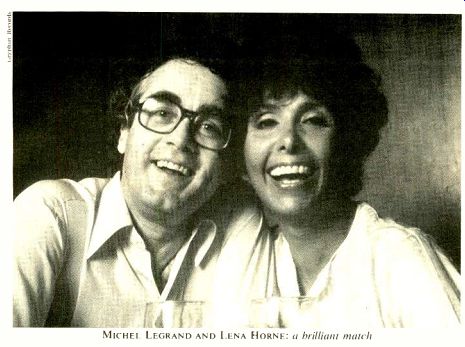
-- MICHEL LEGRAND AND LENA HORNE: a brilliant match
Some noticed long ago that Goodman was a fine guitarist, of course, but the evolution that's going on is a matter of where they, the troubadours, put the emphasis, not where we put it. Songwriting hasn't been shelved or anything (Goodman wrote three new songs for this album and helped write another), it's just that the execution of it, making it sound right, is being brought up to snuff here and there as talent permits. Goodman's talent is ultra-permissive in this case; his vocal sound is not lovely, and you may not have thought of the lad who wrote City of New Orleans as a singer, but here he has written less and (carefully) selected more just so he could sing, it seems, and he never sang (or, for that matter, played) better. His interpretation of friend John Prine's Blue Umbrella uncovers the song's basic spirit better than Prine's more urgent, more aggressive vocal did (and one of the things we need to be rid of is the silly idea that a song's writer can always sing it better than anyone else can), and his delight in finding Mike Smith's nifty song Spoon River may be the energizing force behind the way he and his backers per form it. Something certainly is. And did I say guitarist? Nobody, regardless of his reputation for relevancy, would record It's a Sin to Tell a Lie in this day and age unless he could do something out of the ordinary in performing it, and Good man's unaccompanied picking is so far out of the ordinary that all my calluses went into shock.
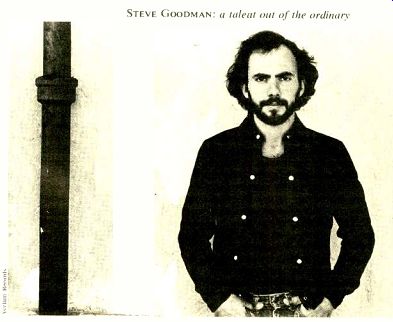
----- STEVE GOODMAN: a talent out of the ordinary
Performance means with other people, though, by and large, and Goodman has been as successful at picking out the other people as he was at picking out the songs. Jethro Burns-know who he is? He's the Jethro of Homer and Jethro, the comedy team, but Goodman apparently noticed that Burns has also been one of the better mandolin players around for years. Then there's Saul Broudy, whose stylized harmonica line does so much for Spoon River and (Goodman's best new song) Lookin' for Trouble. And I could go on. Mama Don't Allow It is a little threadbare, even it if isn't often done in a country-swing scramble like this, but call it an error on the side of growth. The album, on the whole, finds Goodman taking risks and, as the fellow says, picking them clean. -Noel Coppage
STEVE GOODMAN: Jessie's Jig & Other Favorites. Steve Goodman (vocals, guitar); Steve Burgh (guitar); Jethro Burns (mandolin): Saul Broudy (harmonica): Vassar Clements (fiddle); Hugh McDonald (bass); other musicians. Door Number Three; Blue Umbrella; This Hotel Room; Spoon River; Jessie's. Jig (Rob's Romp, Beth's Bounce); It's a Sin to Tell a Lie; I Can't Sleep; Moby Book; Lookin' for Trouble; Mama Don't Allow It, ASYLUM 7E-1037 $6.98.
The Art of La Belle Lena: Far Too Special To Categorize
THERE has never been much doubt I among those who care about such things that Lena Home is one of the most beautiful women of our time. Opin ions have always differed sharply, how ever, as to how good a singer she is. "If you've never seen her, then you really can't appreciate her on records," runs one argument. Another has it that she may be a great and neglected stylist, but that just about everyone copied her unique phrasing and tigerish delivery for so long that it became impossible to appreciate the lustrous original, obscured as she was by garish imitations. It is, I think, fair to say that she is far too special a talent to categorize easily, hard to deny that her sensational looks may well have worked against the success of her recording career. In three and a half de cades of recording, Lena Horne has never been a really hot commercial chart star, but I for one wouldn't want her to be-taste and style have never been mass-market specialties, as a quick look around at any form of the entertainment business will affirm. /overleaf)
Her newest RCA album, "Lena & Michel," brilliantly matches her with composer, arranger, and conductor Michel Legrand; it won't settle any of the arguments about her talents for those still of a mind to argue, nor is it likely to bus any charts, but it is a completely professional, expert, serenely self-assured musical job. Legrand, who has lately been spreading himself as unfortunately thin as gold leaf, is in superb form here cajoling a satiny, form-fitting sound out of his hand-picked band to drape over La Belle Lena. Horne wears it easily and well, adding a little of her own high personal style, her inimitable teasing impatience, to such things as Legrand's / Wil Wait for You. She also spins out the narrative line of the late Jim Croce's Time in a Bottle simply, quietly, and superlatively well, and her performance of the Hal David/Legrand Everything That Happens to You, Happens to Me is a one-round knockout.
In short, the Queen of Sheba is back and don't you just know that a lot of damn fools are going to stand there and quibble about the length and/or the reality of her musical fingernails? Not me.
And, if you really listen, not you either.
Peter Reilly
LENA HORNE & MICHEL LEGRAND: Lena & Michel. Lena Horne (vocals); orchestra Michel Legrand arr. and cond. / Will Wait fo You; I Got a Name; Nobody Knows; Being a That Happens to You, Happens to Me; Sad Song; I've Been Starting Tomorrow All of My Life; Thank You Love; One at a Time; Loneliness; Time in a Bottle. RCA BGL1-1026 $6.98, BGSI-1026 $7.95, BGK1-1026 $7.95.
Waylon Jennings: Suddenly a Low-pitched Baritone Is the Voice to Have
WAYLON JENNINGS IS one of the most important and influential singers of his time. Poets as well as musicians are in awe of him, and he's number one with my friend Vicki and with Vicki's grandmother. That's good enough for me, that and what I hear; one would not have thought such a voice were possible, and one still has trouble believing he can do so much with it.
You've already heard his influence in pop music, though; suddenly a low pitched baritone is the kind of voice to have. The other thing I hear, speaking o influence, is that if Waylon wants to grow a beard, well, by God, Waylon grows a beard; you have to be pretty rugged to practice individualism the country-music business, although (thanks to Jennings) you don't have t be quite so all-fired rugged as you once did.
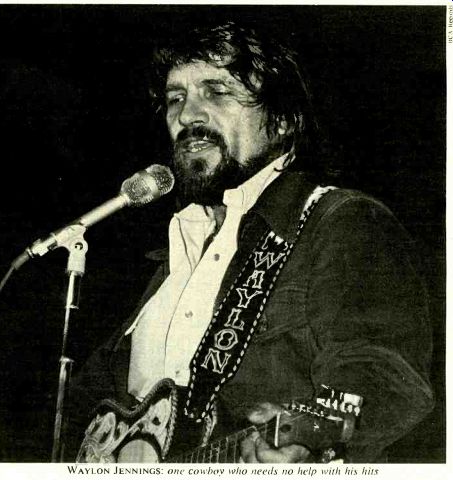
------- WAYLON JENNINGS: one cowboy who needs no help with
his hits
Several of his previous albums have been hurt by erratic song selection, but in RCA's new "Dreaming My Dreams Jennings has smoothed that out pretty well. He does repeat the trick of including a song that's so difficult to sing that others don't dare try it (I've Been a Long Time Leaving, one of the strange early songs by Roger Miller), but, being Jennings, he pulls it off, making a semi-rousing success of it. Let's All Help the Cowboys is a simple three-chord country song (C-F-G, if that saves you some time), but it has such charm that, well, I couldn't do anything else until I'd sat down with the guitar and learned that little sucker. The song that gives the album its title is clearly an outstanding one; you can hate country music and still love it.
Waymore's Blues (Waylon was renamed Waymore and made a character in Ladies Love Outlaws, which Lee Clayton wrote for him sometime ago), a Jennings original, is the kind of up-tempo thing we always hope the fast ones will turn out to be, and is approximately where one notices the carefree, hell-for-leather way some of those old guitars are being played. Jennings is one of the rare good singers capable of playing his own lead guitar, and his stuttering lick mingling with, say, Randy Scruggs' little thou sand-note runs is the kind of combination that keeps instrumental breaks witty and surprising.
High Time (You Quit Your Low-Down Ways), whose country clichés are maybe a little too common place, too everyday, is the album's low point, but it isn't serious enough about being a bad country song to keep this album from being one of the year's better recordings.
- Noel Coppage
WAYLON JENNINGS: Dreaming My Dreams. Waylon Jennings (vocals, guitar); James Colvard (guitar); Randy Scruggs (guitar); Larry Whitmore (guitar); Duke Goff (bass); Ralph Mooney (steel guitar); Richie Albright (drums); Charlie McCoy (harmonica); other musicians. Are You Sure Hank Done It This Way; Waymore's Blues; 1 Recall a Gypsy Woman; High Time; I've Been a Long Time Leaving; Let's All Help the Cowboys; The Door Is Always Open; Let's Turn Back the Years; She's Looking Good; Dreaming My Dreams with You; Bob Wills Is Still the King. RCA APLI-1062 $6.98, APSI-1062 $7.95, APKI-1062 $7.95.
Also see:
Link | --CLASSICAL DISCS and TAPES
Source: Stereo Review (USA magazine)